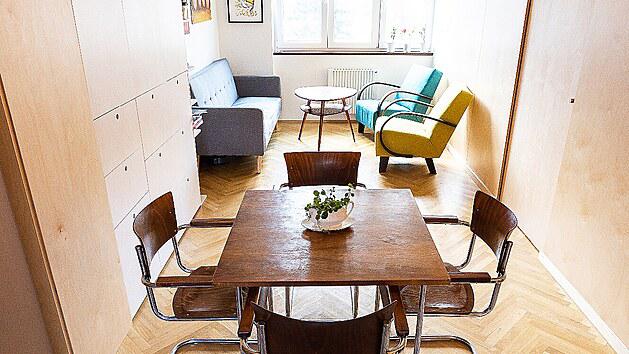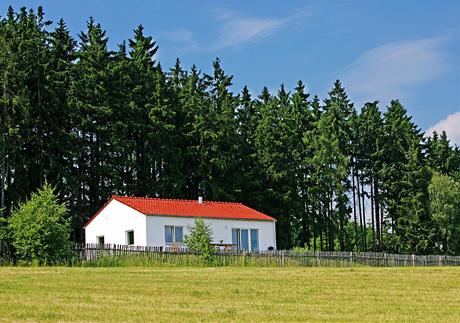
The new Building Act finally passed.Overview of changes
Deputies overrode senators and finally approved the new construction law, the main goal of which is to speed up construction. The law from the workshop of the Minister for Local Development, Klára Dostálova, is to apply from July 1, 2023 (some things will gradually start earlier).
Today MPs of ANO, SPD and KSČM voted for him. At the same time, the Communists voted against the same law at the end of May. A total of 104 of the 162 deputies present voted in favor. Two ČSSD MPs and three non-members also helped to get over the necessary threshold of 101 votes.
Differentiation of building types
The new Building Act distinguishes between small, simple, reserved and other buildings. A "product that fulfills the function of a building", for example a garden or mobile home, will also be considered a building. Proposals for building permits are referred to as building plans.
The division of buildings is important for the need to apply for a building permit, or the possibility of building a building yourself. You can find an overview of individual buildings in Appendices 1 to 3 of the Act.
Appendix No. 1 lists small buildings that fall under other conditions (maximum height, maximum buildable area, respecting the border, etc.) not used for business activities, and others. Only small constructions are not subject to the permit process, for other plans it is necessary to submit a building permit application.
The builder will apply for a building permit at the state regional building office. For reserved buildings listed in Annex No. 3 of the Act (highways and other strategic buildings), the specialized building office will decide on the permit.
State building authorities
The biggest disputes have always been about building authorities. According to the approved law, construction authorities will come under the state. So far, they are in the regime of transferred powers under municipal authorities. At the head of the state building administration will be the Supreme Building Authority with its seat in Ostrava, as well as the Specialized and Appeal Building Authority, and at the lowest level will be the regional authorities with their territorial workplaces. It is the regional authorities that will decide on building permits (except reserved ones) in the first instance, appeals will be possible to the specialized and appeals building authority. A similar organization of state administration already works today, for example, at cadastral or financial offices.
Buying? We can help!
Source: ShutterstockEnough rent. Do you want your own, but you are hesitant about what to pay for it? Mortgage? Building savings loan? We compare offers, you save.
I want a building savings loan. I want a new mortgage. I want to refinance my mortgage. According to MP Martin Kupka (ODS), this will be a problem not only for residents of smaller towns and villages, but also for officials who will participate in local investigations. The Union of Towns and Municipalities describes the nationalization of construction administration as undesirable centralization.The goal of transferring the agenda to the state is professionalization, the replaceability of officials and compliance with deadlines, according to Minister for Regional Development Klára Dostálová (for ANO). "It's not possible for the construction office to close when one clerk gets sick and the other goes on vacation. Thanks to digitization, citizens will be able to apply for a building permit and communicate with the office electronically, and if they want to go to the building office, one of the conditions will be that it is available within a distance of 35 kilometers," says Dostálová.
Officials from the current more than 700 construction authorities should thus move under the state. The survey showed that roughly 40% of current civil servants are willing to switch to a service relationship. Of the current number of seven thousand officials at the general building authorities, roughly four to five thousand are expected to remain after digitization. New buildings for civil servants are not expected, the ministry plans to negotiate with mayors of municipalities so that civil servants can sit where they have been until now. The state is also considering leasing other premises, for example the station building from the Railway Administration.
In addition to professionalization and substitutability, the nationalization of construction administration should also bring about the elimination of so-called systemic bias. It means that the building official of the municipal office cannot be completely impartial in decision-making in construction processes when deciding on matters concerning the interest of the municipality. Even so, the change has many critics.
"Due to the new law, we will find ourselves in a bizarre situation where the development of municipalities and cities will not be handled by the employees of their town halls, who know local specifics well, but on the contrary by central state officials, miles away from the everyday reality in these municipalities," says Prague Mayor Zdeněk Boletus. "By transferring building authorities from the combined model of public administration directly under the state, the unwanted influence of self-government on permitting processes will be limited, and therefore the systemic bias of officials of building authorities will be eliminated," responds Dostálová.
According to the calculations of the Ministry for Regional Development, the one-off costs of changing the system will reach approximately 1.3 billion crowns. According to the ministry, it will pay off handsomely if speeding up the building permit process will help the economy.
Uniform building permit procedure
Instead of the current dual zoning and construction management (and other special procedures), a unified permit procedure led by the building department will be introduced. Although it is still possible to combine zoning and construction management into joint management, according to experts, the introduction of a unified management is clearly a step in the right direction.
Faster permit processes
The authority should issue a building permit for simple buildings within 30 days, for other buildings within 60 days. Where an environmental impact assessment (so-called EIA) will be carried out, the basic period is up to 120 days. These deadlines can be extended by another 30 days if the case is particularly complex, or by up to 60 days in proceedings with a large number of participants.
In the event that the builder makes a mistake in the application, the office will suspend the procedure and the deadlines will not run at that time. Deadlines for decisions in construction procedures still exist today, but the state does not have the ability to force inactive construction authorities to comply with them.
Thanks to the introduction of the so-called appeal principle, the authorities will not be constantly throwing the matter between themselves, but the appeal building authority will have to decide the matter itself. The new acceleration will also be brought about by the fact that in case of non-compliance with the deadline of the subordinate building authority, the superior building authority itself will decide on the matter.
Reduction in the number of stamps
Today, a builder has to go around a number of authorities and obtain dozens of stamps (such as from environmental protection authorities, heritage preservation, fire protection, land development and others). Most of these so-called affected bodies will come under the state building authorities.
"From now on, only the building authorities will decide on the felling of trees, interventions in forests, and the occupation of agricultural land. That is, authorities that are supposed to encourage construction in their job description. Building authorities will even have the last word on construction in national parks," criticizes Petra Kolínská from the association of environmental organizations Zelený kruh.
Source: ShutterstockPoll
Did you support the new construction law?
The exception is a few offices that will remain independent. This is, for example, the fire brigade, or the Nature and Landscape Protection Agency (when permitting projects in protected landscape areas and national parks), which will once again express itself in one document. Monuments will partially pass under the state.
A 30-day period for issuing a statement or a binding opinion will apply to the authorities concerned that do not go to the building authorities. In justified cases, this period can be extended by another 30 days. If the authority does not express itself in time, it will be as if it issued a positive statement or opinion, it will be a so-called fiction of consent. But the fiction of consent does not apply to a binding environmental impact assessment (EIA) opinion.
The building authority will then again arrange for statements from all concerned authorities.
Electronization of construction processes
From July 2023, it will be possible to submit a building permit application electronically. The new system will include two basic records – records of construction procedures and records of electronic documentation.
In the records of construction procedures, the builder can find all information about the construction procedure. The record of electronic documentation will be used to store project documentation. Until now, due to the size of the files, it was not possible to submit project documentation to the building authority electronically.
Basically, nothing needs to change for an ordinary person, if he only wants to build a simple building, he can submit the documentation on paper. In the case of a single-family house, he can then authorize the designer to submit the documentation electronically.
From 2023, the Builder's Portal will operate, which will use electronic identification. It will be possible to use all the possibilities of identification within the framework of the National Identity Authority, i.e. also bank identity. In the portal, it will be possible to view records, monitor the progress of proceedings and submit applications using interactive forms.
Dostálová literally promises that she will be able to handle the building permit from the couch.
The end of black buildings
According to the chairman of the Union of Towns and Municipalities of the Czech Republic and the mayor of Kyjov, František Lukl, due to the distance of officials from buildings, there is also a risk of an increase in black buildings when more distant authorities are unable to monitor the entire administrative area. However, the Ministry is counting on the fact that, on the contrary, the procedure against black buildings will be more consistent. "Municipalities today do not have the equipment or money to remove black buildings. The consequence is that every tenth building is being built in the black. The state will take over this concern from them," promises Minister Dostálová.
Currently, when it is discovered that a building was built without a permit, the building authority orders its removal. At the same time, the builder must be informed that he can apply for an additional permit within 30 days. In order to legalize a black building, it is sufficient for the builder to provide additional documentation. According to the new construction law, he will no longer be able to legalize buildings in this way. The owner or builder will have to demonstrate good faith. And its proof will be limited only to cases where a building permit was issued, which was subsequently canceled by the authority, or the building authority provided the builder with erroneous informal information that the permit was not needed at all.
Apartments in basements?
The controversial amendment by MPs Martin Kolovratník, Adam Kalous (both YES) and Petr Dolínek (ČSSD) removed from the law the requirement that living rooms have direct daylight and direct ventilation. According to the proponents, such direct lighting cannot be ensured in all cases, for example during the reconstruction of some existing apartments, if a building permit is required for the reconstruction.
According to the Ministry for Regional Development, there is no danger of basements being converted into apartments. “The Ministry never agreed to the existence of living quarters without direct ventilation and without daylight. We therefore issued a negative opinion on the amendment proposal, but we were outvoted. Detailed requirements for living rooms from the point of view of healthy living will be determined in the implementing regulation and will refer to the standard values set by the Czech National Register of Citizens. So it will never really happen that a living room without windows passes the approval. Even other cities such as Prague, Brno and Ostrava, which will be able to issue their own building regulations, must comply with Czech and EU regulations," says Jiří Landa from the ministry's press department.
Source: ShutterstockDon't miss anything
Add Peníze.cz to Facebook or Twitter and you won't miss other important news and practical advice!
Veronika Hejná
Other articles by the author.
Print






